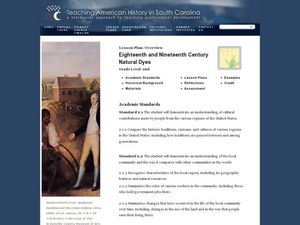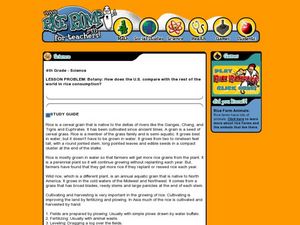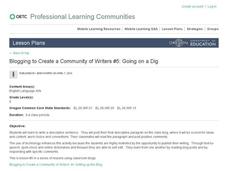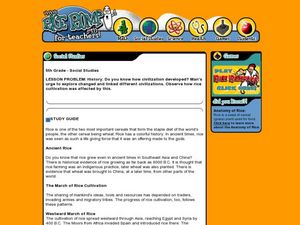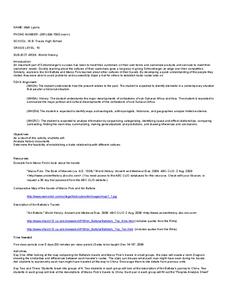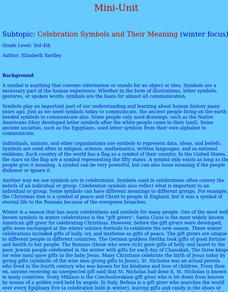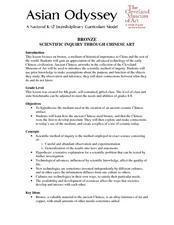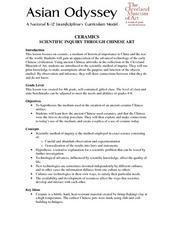Curated OER
Soda Straw Weaving
Students investigate the loom and weaving process. In this weaving lesson, students use soda straws to make a bracelet or a bookmark. Students use the over-under pattern of weaving.
Curated OER
Neanderthals
Students study Neanderthals. In this Prehistoric life lesson plan, students investigate two main theories regarding the relationship between Neanderthals and modern man. Students will conduct research through several provided web sites...
Curated OER
Eighteenth and Nineteenth Century Natural Dyes
Second graders explore the work of Americans when it came to coloring materials. In this interdisciplinary lesson, 2nd graders follow the provided steps to make natural goldenrod dye from scratch.
Curated OER
Rice Consumption
Fourth graders discover facts about rice and how it is farmed. In this rice research lesson, 4th graders investigate how much rice is eaten in the United States compared to other countries. Students research countries and graph the...
Curated OER
Make Your Own Compass
Students explore magnetism. In this "magnets" science lesson, students make a compass with common household items and explain the relationship between what a compass does and the earth's magnetic fields.
Curated OER
Peace and Perspective through Poetry: The Dream of Peace in the Middle East
Students use poetry to understand conflict in the Middle East. In this poetry lesson, students read persona poems and use the poetry and a novel as mentor text to guide their own poem about peace in the Middle East.
Curated OER
Solving a Legend- Exponents, Recursive and Explicit Equations.
Eighth graders play a game to solve problems. In this exponents and scientific notations lesson, 8th graders play a game in small groups to move colored disks from location A to location C. Students identify recursive patterns to solve...
Curated OER
Blogging To Create A Community of Writers # 5 of 7
Here is instructional activity 5 from a 7 instructional activity unit on using blogging to create a community of writers. The aim of this instructional activity is to get students writing about what Archaeologists do and how they use...
Stockton University Wordpress
Civil Disobedience: Is it ever ok to break the law?
As part of a study of civil disobedience, class members read excerpts from the writings of activists who were willing to break the law to protest unjust laws.
Curated OER
Linking Rembrandt and The Odyssey
Students apply knowledge of the style and techniques of Rembrandt to illustrate characters from The Odysey. They respond critically to a variety of works in the arts.
Curated OER
The Fates
In this language arts worksheet, students read the article and define the concepts of life by comparing the parts of life that culminates in death.
Curated OER
Developing Civilizations and the Role of Rice
Student investigate how civilizations developed. In this rice farming lesson, 5th graders explore how rice cultivation changed through different civilizations. Students gain knowledge about different types of rice, where it's grown and...
Curated OER
Detectives of the Past: Dr. Archaeology Travels Back in Time
Students watch a video and complete a webquest to gain a better understanding of the historical significance of the first known civilization, Mesopotamia.
Curated OER
Introduce Vocabulary: Dinosaur Bones
Students discover the meaning of tier two vocabulary words. In this vocabulary lesson, students read Dinosaur Bones, listening for 3 pre-selected, tier two vocabulary words. Words are defined by the teacher and students practice...
Curated OER
Medieval Travelers
Tenth graders explore the impact of trade on culture. For this trade lesson, 10th graders compare the travels of Marco Polo and Ibn Battuta. Students research the explorers and create materials for a gallery walk that feature the impact...
Curated OER
Working Watermelon
You're going to wish you had a watermelon for this lesson! Class members read about watermelons and make a salad in class to sample. They also perform estimates, measurements and calculations on a watermelon. They predict what percentage...
Curated OER
Mosaic Pavement Panel
Students analyze Mosaic art and identify the tessellation process. In this Mosaic art lesson, students read information about Mosaic art and the tessellation process. Students compare mosaics from various civilizations and construct...
Curated OER
China: How to Put Some "Tang" in Your Medieval Dynasties
Fourth graders label the countries that border China and the physical features of Asia. They discuss the physical features of Asia and label them on the other map.
Curated OER
Using Evidence from a Shipwreck to Explore Late Bronze Age Trade in the Mediterranean
Young scholars examine a shipwreck from the late Bronze Age. As a class, they view a variety of slides to describe the cargo and examine the artifacts found on the wreckage. They discuss what each object tells them about the crew and...
Curated OER
Celebration Symbols and Their Meaning
Students develop a symbol that represents something they wish to celebrate or include in a celebration of their choosing.
Curated OER
Make Your Own Petroglyph!
Pupils create their own petroglyph. In this petroglyph lesson plan, students study and compare various petroglyphs. They create their own petroglyph to symbolize the seasons.
Curated OER
What's Right and Wrong? Moral Messages in Art
Students explore the Steen and Mount paintings and their presentation of moral issues. They discuss ethical debates in society today and write a short position paper on an issue raised by the paintings or in the discussion. They make a...
Curated OER
Bronze: Scientific Inquiry through Chinese Art
Learners examine the use of bronze and porcelain in Chinese art and commerce through in-class activities, role play events, and small-group discussions in this exciting Social Studies/Arts instructional activity.
Curated OER
Ceramics Scientific Inquiry Through Chinese Art
Fourth graders explore, examine and study ceramics, a medium of historical importance to China. They review the advanced technology of the early Chinese civilization and are introduced to the scientific method of inquiry and make...




